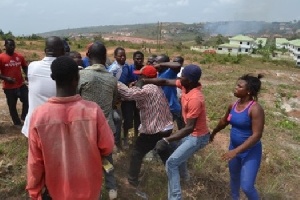Professor John Tia Bugri, the Dean of the Faculty of Built Environment of the Kwame Nkrumah University of Science and Technology, has observed that land litigation is widespread across the country which is frustrating effective land administration.
He said a World Bank report revealed that there are about 35,000 land litigations in the court system.
He said between 40-50 percent of all cases in courts were land-related and that averagely, it takes between three and five years minimum and between eight and 15 years maximum, to successfully resolve land dispute in court.
Prof. Bugri made the disclosure when he made a presentation on the current state of land administration in Ghana: Challenges and bottlenecks, at the Land Administration Reforms Conference in Accra.
The forum brought together experts in the public and private sectors of the economy to brainstorm on challenges facing land administration and make recommendations for land reforms in the country.
It is expected that the meeting would set the right tone for an all-inclusive and frank discussion that would help government roll out strategic interventions for effective and efficient land administration in Ghana.
Prof. Bugri said land data had not been adequately stored, with about 10 per cent of the country’s land properly surveyed, mapped and registered, with only 30 per cent of government land having documents.
He said the Customary Land Secretariat, which was supposed to perform that function had been inconsistent in collecting land data, therefore adversely affecting effective land administration.
“There is the need to build the capacity of institutions so that we don’t only have materials, but the skills of the people are enhanced to perform the task assigned them”.
Prof. Bugri advocated for broad and continuous consultation in land project implementation to ensure success, noting that, lack of broader consultation had resulted in little success in the implementation of the Customary Boundary Demarcation Project.
He said the Land Commission that implemented judgements from the court on land cases did not have a system to receive feedback, therefore, sometimes the decisions it relied on may have been outdated.
Commenting on the right of land ownership in the country, Prof. Bugri said, women and youth rights to access and owned lands had not been the best.
He, therefore, called for reforms in the land administration, if the country really wants to make any headway in development.
He said in the western world, people viewed land as a commodity, but in Africa, land is considered as” land value system and social networks”.
On land accountability, Prof. Bugri said traditional authorities had not been transparent and accountable in their land deals, while the Lands Commission, which is responsible for land administration had not performed creditably as expected, adding; “things must change”.
He said the political economy of land administration is challenging, with government sometimes abusing its power and failing to pay the required compensation to affected persons regarding lands acquired for projects.
General News of Friday, 2 March 2018
Source: ghananewsagency.org

















